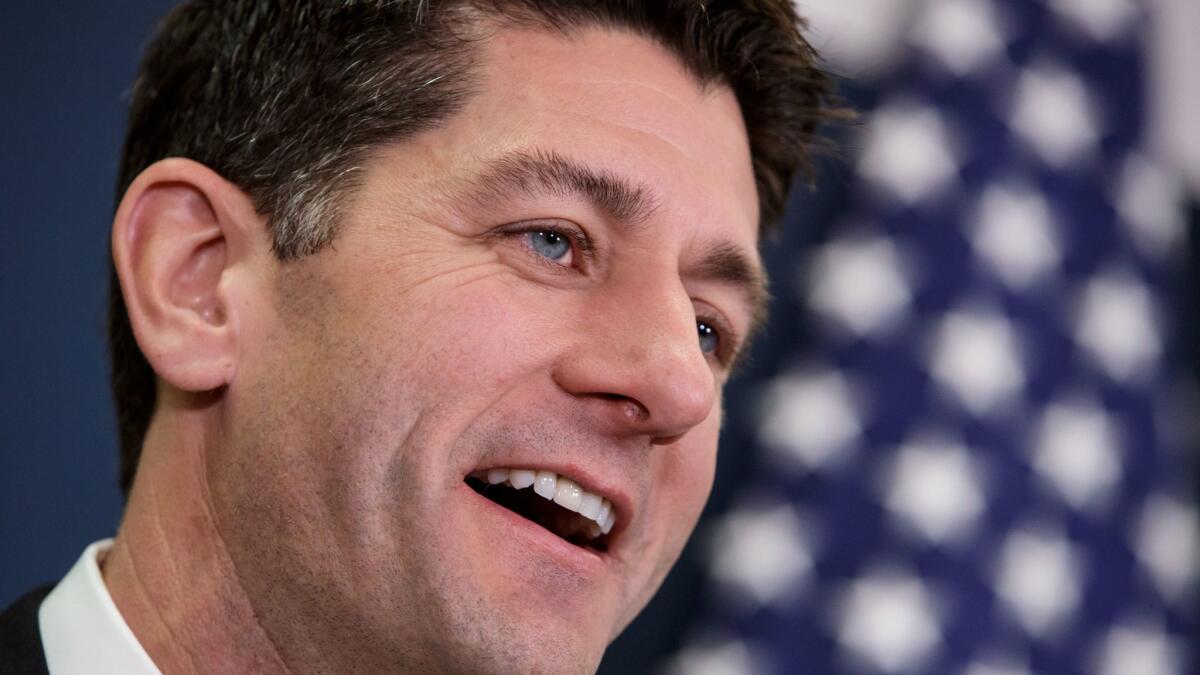Column: Paul Ryan makes it official: Republicans are coming after Medicare next

Apparently emboldened by the likelihood that they’ll pass an enormous tax cut for the rich before the year is out, congressional Republicans such as House Speaker Paul D. Ryan, R-Wisc., have been speaking more openly about how they’re planning to eviscerate government programs for the middle and working class.
Ryan laid out these plans the other day in a remarkable interview with Denver radio host Ross Kaminsky, a conservative and apparently a long-term Ryan supporter. During the companionable 10-minute chat, Ryan identified Medicare and Medicaid as the drivers of “the debt and the deficit.”
Never mind the tax cuts making their way through the Republican-controlled Congress, which nonpartisan analysts predict will explode the deficit by $1.4 trillion over 10 years — Ryan endorsed the GOP talking point that these will pay for themselves through economic growth. That’s an assertion for which neither Congress nor the Trump White House has produced any analytical support.
So we’re going to have to get back next year at entitlement reform, which is how you tackle the debt and the deficit.
— House Speaker Paul Ryan, R-Wisc., forgetting that his tax cuts will drive up the deficit by $1.4 trillion
Ryan couched his policy prescriptions in the context of “entitlement reform,” employing an overused term for social insurance policies that include Social Security and Medicare, the costs of which Americans cover through payroll taxes during their working careers. He acknowledged that cutting Social Security benefits would be a tough lift, since that would probably require 60 votes in the Senate, where the GOP currently has only 52 members.
That leaves the government healthcare programs. Ryan reminded Kaminsky that “the House passed our entitlement reform bill in May… the biggest entitlement reform bill ever passed by Congress.” He’s referring to the House GOP’s Obamacare repeal bill, which would have killed Medicaid expansion under the Affordable Care Act and slashed $800 billion from traditional Medicaid over 10 years by converting it to a block-grant program. Block granting, as we’ve reported in the past, is merely a tool for cutting benefits, with the carnage increasing over time.
As Ryan observed, the House Republicans’ best-laid plans were wrecked by Sen. John McCain, R-Ariz., who in a celebrated moment turned thumbs-down on the Senate’s version of the ACA repeal bill, killing the Senate bill and ending the fun for both chambers.
“So we’re going to have to get back next year at entitlement reform, which is how you tackle the debt and the deficit,” Ryan said. He told Kaminsky that Medicare reform “has been my big thing for many, many years, because it’s the biggest entitlement. It’s gotta be reformed.”
Ryan’s description of Medicare, however, displayed all the sophistry he’s shown in his previous discussions of American healthcare. He plainly doesn’t understand Medicare — or if he does, he hides it well.
“We need to convert our healthcare system to a patient-centered system so that people have more choice [and] we have more competition,” he said. What does this vacuous statement even mean? “Patient-centered” healthcare is a conservative shibboleth. It often refers to a system in which patients pay a larger share of costs so they will make more discerning judgments about when to go to the doctor. There’s no evidence that higher deductibles or co-pays produce better care — that does produce less care, but the evidence is that people end up seeing the doctor less for genuine needs as well as frivolous reasons.
“Patient-centered” care is more often used as a guideline to a sort of bedside manner — giving the patient more of a voice in his or her treatment, more information, more opportunity to ask questions. But as two family medicine experts observed in a 2011 paper, the changes are often cosmetic — hotel-like amenities such as “greeters, greenery, and gadgetry.”
How Congress can legislate anything like patient-centered care is a mystery that Ryan didn’t bother to try solving — he just threw the term out like a smoke bomb to conceal that he’s really only talking about cutting benefits. Patient-centered care as it’s commonly understood won’t give patients more choice — in the vast majority of clinical encounters, patients don’t want “choice” — they want an urgent health problem to be addressed. And it has nothing to do with competition.
“Choice and competition,” Ryan said, “brings down prices, improves quality. Government healthcare is the opposite of that.”
Actually, he’s dead wrong. Medicare, which specifies reimbursement rates for all the doctors who compete to serve its enrollees, is in fact the most efficient healthcare delivery system in the nation, with the lowest administrative costs. Far from suppressing innovation, Medicare has been a fount of innovation. The program has been a leader in testing new models for healthcare payment and new approaches to, yes, “patient-centered” care.
Ryan just wants to cut costs, but his prescriptions, such as they are, won’t do that. Medicare and Medicaid can’t actually be “reformed” from within; they’re both prisoners of overall healthcare costs. That’s what needs to be reformed — how we pay doctors and hospitals, how we judge the value of medical outcomes, and how much we allow drug companies to charge patients for their products.
None of those factors is on Paul Ryan’s agenda. He’s just talking about shifting the embedded costs of healthcare from government to individuals, and in a way that will drive costs up, not down. As long as he chooses his interviewers carefully, his lies and misrepresentations aren’t going to get the scrutiny they deserve. But since’s he’s threatening to turn them into policy, it’s time they did.
Keep up to date with Michael Hiltzik. Follow @hiltzikm on Twitter, see his Facebook page, or email michael.hiltzik@latimes.com.
Return to Michael Hiltzik’s blog.







